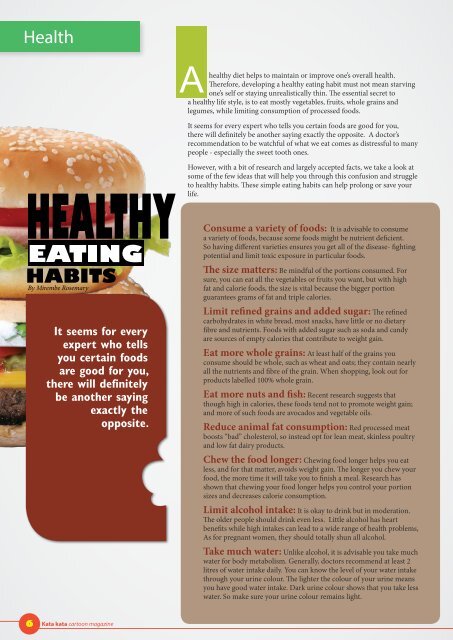2016 EDITION vol.3 issue 13 DIGITAL
Create successful ePaper yourself
Turn your PDF publications into a flip-book with our unique Google optimized e-Paper software.
Health<br />
healthy diet helps to maintain or improve one’s overall health.<br />
Therefore, developing a healthy eating habit must not mean starving<br />
one’s self or staying unrealistically thin. The essential secret to<br />
a healthy life style, is to eat mostly vegetables, fruits, whole grains and<br />
legumes, while limiting consumption of processed foods.<br />
It seems for every expert who tells you certain foods are good for you,<br />
there will definitely be another saying exactly the opposite. A doctor’s<br />
recommendation to be watchful of what we eat comes as distressful to many<br />
people - especially the sweet tooth ones.<br />
However, with a bit of research and largely accepted facts, we take a look at<br />
some of the few ideas that will help you through this confusion and struggle<br />
to healthy habits. These simple eating habits can help prolong or save your<br />
life.<br />
HABITS<br />
By Mirembe Rosemary<br />
Consume a variety of foods: It is advisable to consume<br />
a variety of foods, because some foods might be nutrient deficient.<br />
So having different varieties ensures you get all of the disease- fighting<br />
potential and limit toxic exposure in particular foods.<br />
The size matters: Be mindful of the portions consumed. For<br />
sure, you can eat all the vegetables or fruits you want, but with high<br />
fat and calorie foods, the size is vital because the bigger portion<br />
guarantees grams of fat and triple calories.<br />
Limit refined grains and added sugar: The refined<br />
carbohydrates in white bread, most snacks, have little or no dietary<br />
fibre and nutrients. Foods with added sugar such as soda and candy<br />
are sources of empty calories that contribute to weight gain.<br />
Eat more whole grains: At least half of the grains you<br />
consume should be whole, such as wheat and oats; they contain nearly<br />
all the nutrients and fibre of the grain. When shopping, look out for<br />
products labelled 100% whole grain.<br />
Eat more nuts and fish: Recent research suggests that<br />
though high in calories, these foods tend not to promote weight gain;<br />
and more of such foods are avocados and vegetable oils.<br />
Reduce animal fat consumption: Red processed meat<br />
boosts “bad” cholesterol, so instead opt for lean meat, skinless poultry<br />
and low fat dairy products.<br />
Chew the food longer: Chewing food longer helps you eat<br />
less, and for that matter, avoids weight gain. The longer you chew your<br />
food, the more time it will take you to finish a meal. Research has<br />
shown that chewing your food longer helps you control your portion<br />
sizes and decreases calorie consumption.<br />
Limit alcohol intake: It is okay to drink but in moderation.<br />
The older people should drink even less. Little alcohol has heart<br />
benefits while high intakes can lead to a wide range of health problems,<br />
As for pregnant women, they should totally shun all alcohol.<br />
Take much water: Unlike alcohol, it is advisable you take much<br />
water for body metabolism. Generally, doctors recommend at least 2<br />
litres of water intake daily. You can know the level of your water intake<br />
through your urine colour. The lighter the colour of your urine means<br />
you have good water intake. Dark urine colour shows that you take less<br />
water. So make sure your urine colour remains light.<br />
6 Kata kata cartoon magazine

















